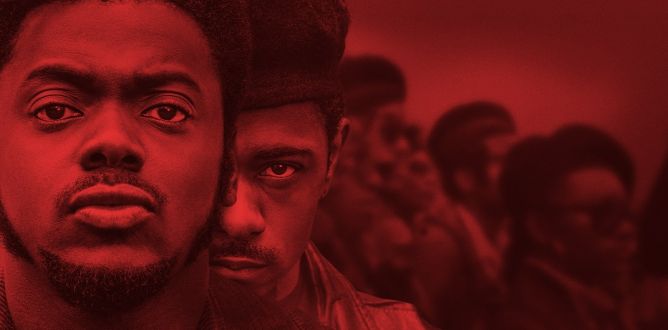Judas and the Black Messiah Parent Guide
This wrenching story of betrayal and racial politics is all the more painful for its contemporary relevance.
Parent Movie Review
It’s 1968 and FBI Director J. Edgar Hoover (Martin Sheen) describes the Black Panthers as “the single greatest threat to our national security.” Desperate to contain these homegrown revolutionaries, Hoover is determined to “prevent the rise of a Black Messiah from among their midst.”
To succeed, the FBI is going to need a Judas.
Agent Roy Mitchell (Jesse Plemons) has Hoover’s directive in mind when he comes across a young car thief. Bill O’Neal (LaKeith Stanfield) has been stealing cars while posing as an FBI agent – and being interrogated by a real G-Man is more than his shaky nerves can handle. He’s given a choice: go to prison for six years or infiltrate the Chicago chapter of the Black Panthers.
O’Neal’s mission is a dangerous one and he knows that snitches will be tortured and killed by the revolutionaries they betray. His fear and guilt are soon complicated by growing respect for the Panthers’ local chairman, Fred Hampton (Daniel Kaluuya). The charismatic young leader does more than make rousing speeches: he also ensures that the Panthers meet the social needs that come with entrenched poverty. The activists provide free meals, education, and medical care to the needy in the community. Hampton even manages to broker alliances with Black and Puerto Rican gangs as well as White nationalists.
As the Panthers’ influence grows, so does Hoover’s determination to get Hampton off the streets. O’Neal is given a dangerous mission; one he’s not sure he can carry out…
I love history films, and Judas and the Black Messiah is an absorbing one, depicting a dark chapter in America’s past. It’s painful to watch, not just for its tragic story, but because it’s still relevant today. The production raises issues of police brutality, over-incarceration, and the ongoing quest for racial equality that still consume American society and politics fifty years later.
History films often feel like documentaries, but this doesn’t because it also tells a deeply personal story; one of betrayal, deceit, and treachery. Stanfield may well possess the saddest eyes in Hollywood and they are well employed here, showing the grief, guilt, pain, and self-loathing that torment Bill O’Neal. My only complaint with the casting is that Stanfield is too old for the part – in real life, Bill was only 17 when he was coerced into becoming an FBI informant. The rest of the cast are also worth watching. It’s chilling to watch Martin Sheen run the FBI with the quiet menace of a mob boss. And Daniel Kaluuya brings fervor and an understated melancholy to his role as Fred Hampton.
The story is compelling and the movie is well made, but I can’t recommend it for family viewing, thanks to its nearly 150 swear words, over half of which are sexual expletives. The film also has frequent scenes of violence, many involving firearms, as well as cold blooded assassinations. But if you want to confront the legacy of the past and see how it casts a shadow over the present, Judas and the Black Messiah is a good place to start.
Directed by Shaka King. Starring LaKeith Stanfield, Daniel Kaluuya, Jesse Plemons, Martin Sheen, Dominique Fishback. Running time: 125 minutes. Theatrical release February 12, 2021. Updated October 2, 2021Watch the trailer for Judas and the Black Messiah
Judas and the Black Messiah
Rating & Content Info
Why is Judas and the Black Messiah rated R? Judas and the Black Messiah is rated R by the MPAA for pervasive language
Violence: There is news footage of fires and riots. Police are seen beating protesters. A man headbutts a police officer. Men try to stab a man through the roof of his car. A man bites someone. A man calls for guns and revolution. A man is seen with bloody wounds on his face. People sing that “revolution is the only solution”. People point firearms at others on several occasions. A man defends himself with a pool cue. There is brief mention of cutting off a man’s genitals. A man strikes another one in the face. There is talk of drowning someone in the river. There is mention of pouring boiling water all over a man’s genitals. A man is seen shirtless and covered with bloody cuts. Prison guards beat a man for no reason; he fights back. A firefight takes place between police officers and a Black man. There is a shootout between police and a group of people holed up in a building; a man is shot in the shoulder and blood is visible. Police beat a wounded man. Police set fire to an office building. There is brief mention of rape in the context of race war. Police are suspected of killing a wounded man. A man encourages his followers to kill police officers. There are multiple shootouts between civilians and police officers. A man is shot dead by the police. A police officer is shot by an injured man. A man dreams of being shot. A man obtains explosives and discusses a major explosion. There is a discussion of assassination. Police attack and shoot up a house full of people. Police beat man with rifle. Police stick a gun against a pregnant woman’s abdomen.
Sexual Content: A fully clothed couple are shown in bed together. A man and woman kiss.
Profanity: This film is full of profanity including approximately 86 sexual expletives (one in writing), two dozen scatological curses, a dozen terms of deity, a dozen minor curses, and seven crude anatomical terms. Over a dozen racial slurs are used and police are referred to as “pigs” throughout the film.
Alcohol / Drug Use: Main characters smoke cigarettes in several scenes. Adults are seen drinking alcohol in a bar. A main character gets drunk to drown painful emotions.
Page last updated October 2, 2021
Judas and the Black Messiah Parents' Guide
In a speech in the film, Fred Hampton says, “That’s the difference between revolution and candy coated façade of gradual reform. Reform is just the master teaching the slaves to be better slaves.” Do you agree or disagree? Do you think reform is a safer way of achieving change or do you think it’s a way of deferring it? What do you think are the costs and benefits of revolutionary change? Is the destruction caused by revolution worth the potential gains?
Agent Mitchell tells William O’Neal, “The Panthers and the Klan are one and the same. Their aim is to sow hatred and cause terror. You can’t cheat your way to equality and you certainly can’t shoot your way to it.” Do you agree with Mitchell or do you think it’s a false equivalence? What are the goals of the Ku Klux Klan? How does the Klan try to achieve its aims? What are the goals of the Black Panthers? How do they try to achieve those goals?
For more information about the history the movie depicts, check the following links.
National Archives:
The Guardian: Black power’s coolest radicals (but also a gang of ruthless killers)
Wikipedia: Ten Point Program
Wikipedia: Fred Hampton
The Washington Post: The police raid that killed two Black Panthers, shook Chicago and changed the nation
Loved this movie? Try these books…
A history of the Black Panthers can be found in The Revolution Has Come by Robyn Spencer. The movement’s history is also the subject of a graphic novel by David F Walker and Marcus Kwame Anderson, entitled The Black Panther Party: A Graphic Novel History.
For an in-depth look at Fred Hampton’s death, look for Jeffrey Haas’s The Assassination of Fred Hampton: How the FBI and the Chicago Police Murdered a Black Panther.
More information about the FBI’s COINTELPRO tactics can be found in The FBI War on Tupac Shakur and Black Leaders by John Potash.
Home Video
Related home video titles:
Fred Hampton appears in The Trial of the Chicago 7and his death is a plot element in the film.
Another activist concerned with black power is Malcolm X, who also took an assertive stance.
The FBI didn’t restrict its surveillance to the Black Panthers. The documentary MLK/FBIexposes the Bureau’s attempts to discredit the civil rights leader.




